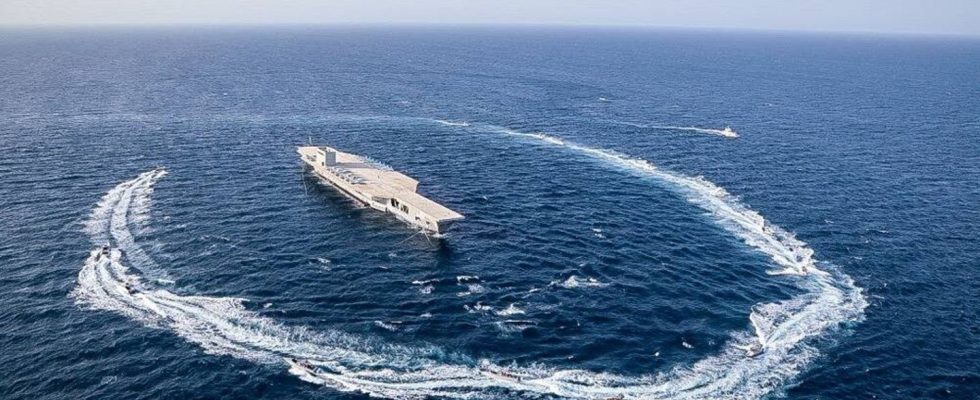Secure trade routes
EU military operation in the Red Sea could be expanded to include the coast of Iran
Dummy of a US aircraft carrier during a naval exercise near the Strait of Hormuz (archive image)
© Sepahnews / Imago Images
The EU has decided on a new military operation because of the Houthi attacks on merchant ships in the Red Sea. Can it also provide deterrence in other maritime areas?
One reason for the decision are numerous incidents in recent years. Most recently, Iran’s navy seized an oil tanker belonging to the Greek shipping company Empire Navigation in the Gulf of Oman in January. The USA also criticized this sharply. They have long accused the Iranian navy of hindering important civilian shipping traffic in the sea areas. In particular, the Strait of Hormuz, an approximately 55 kilometer wide strait between Iran and Oman, is considered one of the most important shipping routes for international oil exports.
Impact on the global economy
The primary aim of the EU operation is to protect merchant ships from attacks by the militant Islamist Houthis from Yemen. The militia wants to force an end to the Israeli attacks in the Gaza Strip by shelling ships, which followed the unprecedented massacre by the Islamist Hamas in Israel on October 7th.
Given the dangers, major shipping companies are increasingly avoiding the shortest sea route between Asia and Europe through the Red Sea and the Suez Canal. This now has a significant impact on the global economy. The USA and Great Britain are therefore directly attacking Houthi targets in Yemen.
Tight limits on the use of weapons
However, the EU does not want to take part in such proactive operations. The order that has now been decided on for the operation states that Aspides should accompany ships in the operational area and protect them from attacks in a sub-area “in full compliance with international law”. Specifically, the principles of necessity and proportionality are mentioned.
The Bundeswehr wants to take part in the operation with the frigate “Hessen”. The ship with around 250 soldiers on board left the naval base in Wilhelmshaven for the Red Sea on Thursday. It is equipped, among other things, with anti-aircraft missiles and was specifically designed for escort and maritime control. According to the Bundeswehr, it can use its special radar to monitor airspace the size of the entire North Sea.
German commander speaks of an endurance test
According to a statement from the Navy, the frigate’s commander, Frigate Captain Volker Kübsch, said: “A potential deployment in the Red Sea will represent another endurance test for the ship and crew.” The threat there is not abstract, but very concrete and consists of a large number of weapons that are regularly used there.
In addition to warships, airborne systems such as aircraft and drones should also be able to be used. It is also planned that the EU satellite center Satcen and the intelligence situation center Intcen will support the operation. The decision to start the operation, which is initially limited to one year, should be made no later than February 19th at an EU foreign ministers meeting in Brussels.

